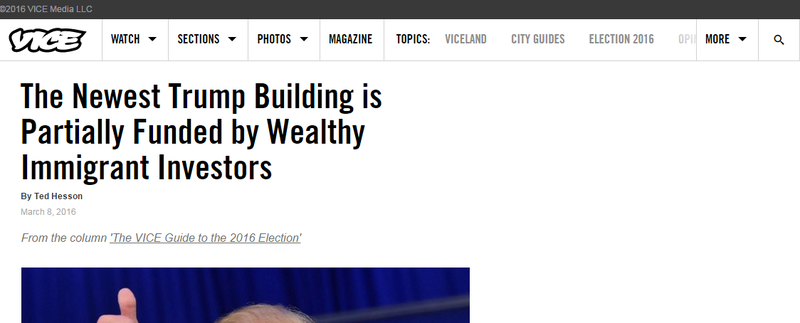The Newest Trump Building is Partially Funded by Wealthy Immigrant Investors
The promotional materials for 88 Kushner-KABR, also known as Trump Bay Street, show a building designed with comforts and amenities certain to attract opulent buyers: There are panoramic views of the Manhattan skyline, an address just blocks from the Hudson River, and real estate developers with a proven reputation for success.
But this sales pitch for the 50-story, 447-unit apartment building isn't meant for buyers. It's targeting wealthy foreign investors, whom developers hope will trade capital for permanent residency in the United States.
The building is a second tower under construction alongside Trump Plaza in Jersey City's booming luxury real estate market. The $218 million high-rise, announced in 2014, was heralded by The Wall Street Journal as the first big deal between Donald Trump and his son-in-law, Jared Kushner, who is married to Ivanka and heir to a real estate fortune of his own. To finance the project, the developers (Kushner Companies and KABR Group, a New Jersey real estate firm) are using $50 million of the $218 million project from wealthy immigrants, secured through an investor visa program known as EB-5, as a Bloomberg Politics report pointed out on Sunday.
The EB-5 investor visa program, created in 1990, offers visas to immigrants who invest $1 million in a commercial project that will create or preserve at least ten jobs in the United States. (They can invest $500,000 if the project takes place in a high-unemployment area.) The program provides a maximum of 10,000 visas each year, many of which lead to green cards: In 2012, only 6 percent of EB-5 visa holders were denied for permanent residency, according to the Brookings Institution.
"This is a really different visa program," said Audrey Singer, a senior fellow at the Brookings Institution, a nonpartisan think tank based in Washington, DC. "Most visa programs don't involve any kind of a business deal, and most business deals don't involve issuing visas."
For most of its existence, the EB-5 visa program was largely unused. But as lending standards tightened after the 2008 recession, American developers began to see the program as a viable source of low-interest financing. A more robust recruiting infrastructure emerged abroad, particularly in China, pitching affluent investors on the idea of an EB-5 visa as a relatively certain path to permanent residency in the US. The program hit its visa limit for the first time in 2014, and again in 2015.
A spokesperson for Donald Trump's presidential campaign declined to comment in detail about the Republican frontrunner's involvement with the EB-5 program and the second tower being built alongside Trump Plaza in Jersey City. "This was a highly successful license deal but he is not a partner in the financing of the development," she wrote in a statement via email. Trump often works with developers who pay a licensing fee to use his name, while not dealing directly with financing.
Mentions
States
- New Jersey
Securities Disclaimer
This website is for informational purposes only and does not constitute an offer or solicitation to sell shares or securities. Any such offer or solicitation will be made only by means of an investment's confidential Offering Memorandum and in accordance with the terms of all applicable securities and other laws. This website does not constitute or form part of, and should not be construed as, any offer for sale or subscription of, or any invitation to offer to buy or subscribe for, any securities, nor should it or any part of it form the basis of, or be relied on in any connection with, any contract or commitment whatsoever. EB5Projects.com LLC and its affiliates expressly disclaim any and all responsibility for any direct or consequential loss or damage of any kind whatsoever arising directly or indirectly from: (i) reliance on any information contained in the website, (ii) any error, omission or inaccuracy in any such information or (iii) any action resulting therefrom.




